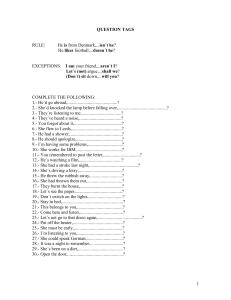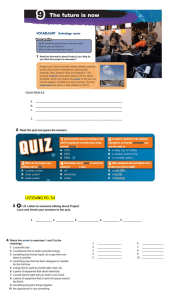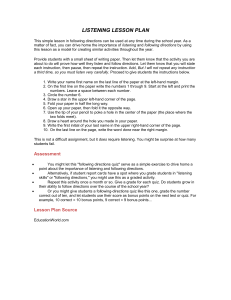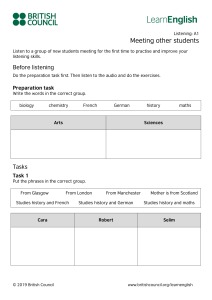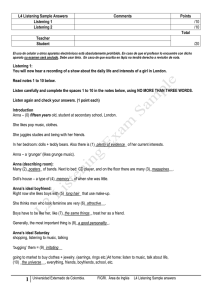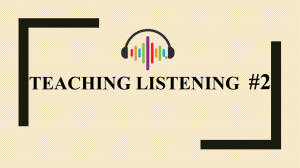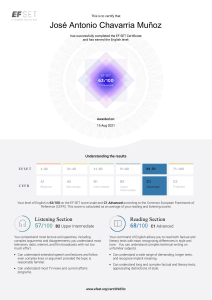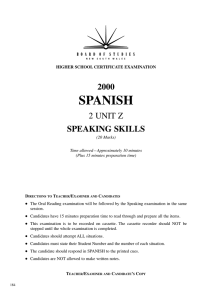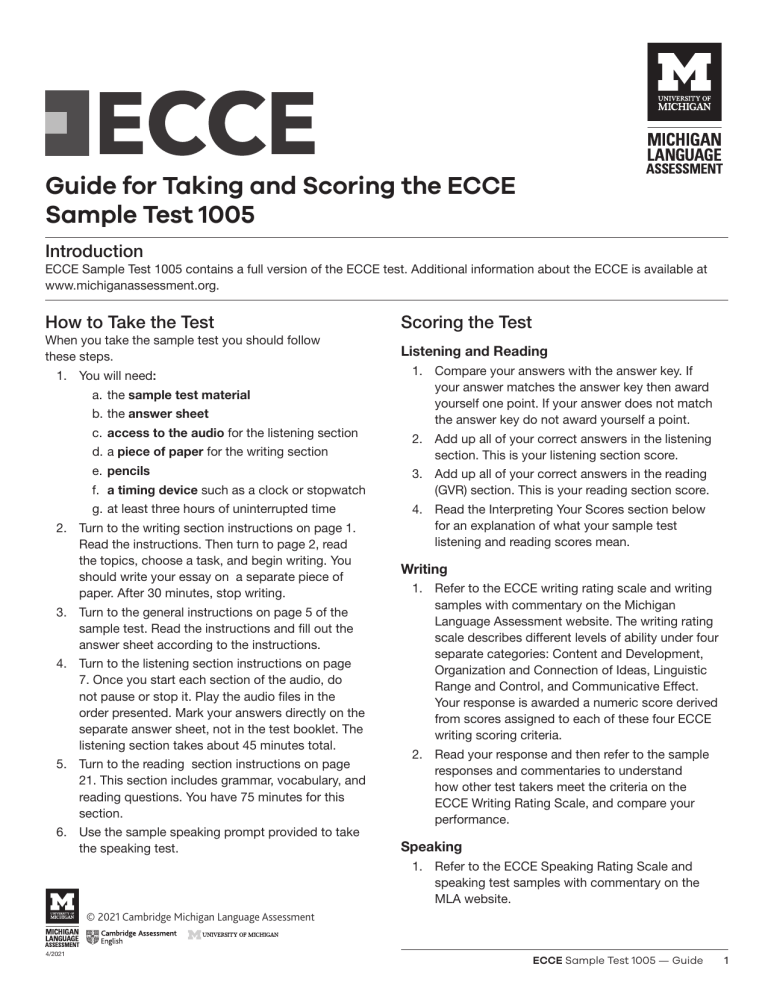
Guide for Taking and Scoring the ECCE Sample Test 1005 Introduction ECCE Sample Test 1005 contains a full version of the ECCE test. Additional information about the ECCE is available at www.michiganassessment.org. How to Take the Test Scoring the Test When you take the sample test you should follow these steps. Listening and Reading 1. You will need: a. the sample test material b. the answer sheet c. access to the audio for the listening section d. a piece of paper for the writing section e. pencils f. a timing device such as a clock or stopwatch g. at least three hours of uninterrupted time 2. Turn to the writing section instructions on page 1. Read the instructions. Then turn to page 2, read the topics, choose a task, and begin writing. You should write your essay on a separate piece of paper. After 30 minutes, stop writing. 3. Turn to the general instructions on page 5 of the sample test. Read the instructions and fill out the answer sheet according to the instructions. 4. Turn to the listening section instructions on page 7. Once you start each section of the audio, do not pause or stop it. Play the audio files in the order presented. Mark your answers directly on the separate answer sheet, not in the test booklet. The listening section takes about 45 minutes total. 5. Turn to the reading section instructions on page 21. This section includes grammar, vocabulary, and reading questions. You have 75 minutes for this section. 6. Use the sample speaking prompt provided to take the speaking test. 1. Compare your answers with the answer key. If your answer matches the answer key then award yourself one point. If your answer does not match the answer key do not award yourself a point. 2. Add up all of your correct answers in the listening section. This is your listening section score. 3. Add up all of your correct answers in the reading (GVR) section. This is your reading section score. 4. Read the Interpreting Your Scores section below for an explanation of what your sample test listening and reading scores mean. Writing 1. Refer to the ECCE writing rating scale and writing samples with commentary on the Michigan Language Assessment website. The writing rating scale describes different levels of ability under four separate categories: Content and Development, Organization and Connection of Ideas, Linguistic Range and Control, and Communicative Effect. Your response is awarded a numeric score derived from scores assigned to each of these four ECCE writing scoring criteria. 2. Read your response and then refer to the sample responses and commentaries to understand how other test takers meet the criteria on the ECCE Writing Rating Scale, and compare your performance. Speaking 1. Refer to the ECCE Speaking Rating Scale and speaking test samples with commentary on the MLA website. © 2021 Cambridge Michigan Language Assessment 4/2021 ECCE Sample Test 1005 — Guide 1 2. Listen to your recorded response and then refer to the sample responses and commentaries to understand how other test takers meet the criteria on the ECCE Speaking Rating Scale, and compare your performance. Passing the ECCE Overall ECCE section scores are reported in five bands. The levels of performance, from highest to lowest, are: ECCE Reporting System Band Scores Scaled Score Per Section Interpreting Your Scores Honors (H) 840 –1000 When the ECCE is taken under examination conditions, the listening section and the reading (GVR) section are scored electronically using Item Response Theory (IRT). This method ensures that the ability required to pass a section, or to receive a high score, remains the same from year to year. IRT scores are not the same as number-right scores or percentage scores, but there is very high correlation between the number of correct answers provided and the IRT scores. Pass (P) 750 –835 Low Pass (LP) 650 –745 Borderline Fail (BF) 610 –645 Listening Section • Scores 29 and above: If you have strictly followed the instructions for taking the practice test, you are likely to pass the listening section of the ECCE under examination conditions. • Scores 25–28: You have a chance of passing the listening section of the ECCE under examination conditions but you may benefit from more lessons or more practice before you register for the examination. • Scores 24 and below: You are unlikely to pass the listening section of the ECCE under examination conditions and should spend more time improving your English before taking the examination. Reading (GVR) Section • Scores 42 and above: If you have strictly followed the instructions for taking the practice test, you are likely to pass the reading section of the ECCE under examination conditions. • Scores 37–41: You have a chance of passing the reading section of the ECCE under examination conditions but you may benefit from more lessons or more practice before you register for the examination. • Scores 36 and below: You are unlikely to pass the reading section of the ECCE under examination conditions and should spend more time improving your English before taking the examination. Fail (F) 0 –605 ECCE test takers who achieve an average score of 650 or higher will be awarded a certificate. Additionally, those who achieve a score of 840 or higher in all four sections will be awarded a Certificate of Competency with Honors. Look at all your scores on the sample test sections. • If your score is 29 or above on the listening section and 42 or above on the reading section, you are likely to pass the ECCE under exam conditions. • If your score is 25 or higher on the listening section and 37 or higher on the reading section, you have a chance at passing the ECCE under exam conditions. If you are able to meet the passing standards on the sample test, then you are probably ready to take the ECCE. Important Points to Note 1. Although the sample materials are designed to be similar in difficulty to the ECCE and will give you a reasonable idea of how you should expect to score on the exam, there is no guarantee that your score on the sample materials will be the same as the score you receive when you take the ECCE. 2. The writing section and speaking section scores you receive when you take an ECCE under examination conditions are determined by raters trained and certified according to standards established by MLA. It is possible that when you review your own writing and speaking performances, the scores assigned might be different from those that would have been assigned by certified raters and examiners. ECCE Sample Test 1005 — Guide 2
